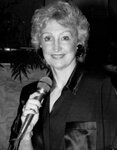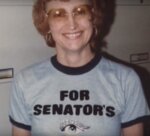


FRIDAY, Dec. 22 — Betty Baxter, a breezy jazz vocalist with a winning, lowkey presence and an encyclopedic knowledge of the Great American Songbook, died Thursday morning at 91 after fighting off several health problems.
Baxter, a subtle but strong staple of the mid-Michigan jazz scene for decades, sang in a smooth, conversational style that drifted through the room like the smell of lilacs.
She never tried to overpower the audience. She used vibrato sparingly and kept her intonation on a relaxed leash. If there was effort involved, and there surely was, it didn’t show.
Baxter knew her strengths but downplayed them at every turn.
"Everybody does these heavy blues,” she told City Pulse in 2015. “I just get up and sing. I'm just me."
She frequently insisted that she was a poet and storyteller, not a singer.
Lois Mummaw, a friend of Baxter’s and a longtime supporter of the local jazz scene, said Baxter “could have been a cabaret star, a Broadway star.”
“She had a great singing voice, but more than that, she told stories in song,” Mummaw said. “She could hold a room.”
Well into her 80s, Baxter sang at local jazz festivals and was a regular at Jazz Tuesdays at Moriarty’s Pub.
“She always lit up the room with her voice and presence,” drummer and Jazz Tuesdays organizer Jeff Shoup said. “Over the years, she was featured many times. She attended almost every week until the travel got to be too difficult for her. Betty is deeply missed by all of us in the Jazz Tuesdays extended family.”
Baxter loved to breathe new life into long-forgotten old songs. “I Keep Goin’ Back to Joe’s,” an obscure torch song first recorded by Nat King Cole in 1963, became a signature song.
Guitarist Doug Fritch played with Baxter for nearly 10 years.
“We played that song nearly every time I played with her,” Fritch said.
The sad tale of a scorned woman who haunts the bar where she used to meet her lover was a perfect vehicle for Baxter’s storytelling skills. She sang it at a leisurely pace, almost savoring the lonely ambiance of a space filled only with memories.
“I used to go over to her house on Wednesdays, and we’d just run through songs,” Fritch recalled. “She’d show me tunes I never knew were around. She had the sharpest ear, and she knew the lyrics to every song.”
Baxter surprised Fritch by singing the introductory verse to the songs, a practice that has all but died out, from memory.
“Lush Life,” “Black Coffee” and “Stardust” were near the top of her setlist.
“I have four huge binders full of music she copied for me,” Fritch said.
As a youngster growing up in Grand Rapids, Baxter sang and danced to the music coming from the radio. At the movies, she fell harder than most for the charisma of Shirley Temple.
"I wanted nothing else but to be her," Baxter said.
According to Baxter, family lore had it that when she was 2 years old, she stood up in her seat at a movie theater, enthralled by Temple’s dancing, and screamed, “Did you see her fall on her ass?”
If there was any Shirley Temple left in Baxter's latter-day jazz performances, it lay mostly in her rapport with the audience. Although her serious jazz sets were heavy on melancholy ballads, she got frequent requests for Chet Atkins and Ray Stevens’ goofy “Frog Kissin,” a tune you could easily imagine Shirley Temple singing.
"I like to get up there and get silly and make a fool of myself," she said. "But I also like to sing about love and heartache."
As a teenager, Baxter quickly surpassed her tap dance teacher and graduated to musical theater. She later recalled “bouncing around from one relative to another,” living on farms and “climbing windmills.”
Her first role was a juicy one: the lovelorn Adelaide in "Guys and Dolls" at Grand Rapids’ Circle at the Rowe theater in 1957. She tried out for the role with less than half a dozen lessons behind her. As soon as she started singing, the auditions were closed. Her performance wowed both audiences and critics.
In the 1960s, Baxter moved to Philadelphia, appearing in shows like "Flower Drum Song" and "You Can't Take It with You" while working as an accountant. When she was transferred to Los Angeles, she sang sporadic gigs and ended up on the same bill as crooner Pat Boone one night.
At another Los Angeles gig, she asked to sit in with bassist Leroy Vinnegar.
"He looked at me like most piano players probably look at most chick singers who couldn't carry a tune in a basket," Baxter said.
Vinnegar ended up playing with Baxter for much of the night and gave her some original tunes to record.
Baxter moved to Lansing in 1977 to work in the Michigan Senate, first as a clerk and then as an accountant. At night, she began singing at various venues with local stalwarts like pianist Sandy Izenson, a frequent collaborator until Izenson died in 2008.
“I needed a piano player who could play in any key because I never know what key I’m going to sing in,” Baxter said.
Baxter credits pianist-bassist Fred Mitchell with turning her attention from musical comedy to jazz.
Early on, Mitchell asked Baxter if she knew who Bill Evans was. (Evans was the lyrical, sophisticated pianist who dominated the post-bop era and is best known for playing with trumpeter Miles Davis.)
"Bill Evans? Where is he playing?" she naïvely asked him. Evans died in 1980.
Before long, Baxter seamlessly blended the prismatic harmonies, mercurial shifts and layered nuances of mid-20th-century jazz into her extroverted, audience-pleasing style.
"I became jazz," she said. "I haven't looked back since."
Baxter, Mitchell and Izenson played dozens of Lansing-area venues under the name Satin Sounds.
The band became a staple at all kinds of venues and special events around town. Baxter reached happily into her bottomless songbook to regale residents of Burcham Hills Retirement Community with the older stuff, then pivoted to modern jazz for festival and bar gigs.
No venue was too small. At a practice session with Fritch, Baxter proudly showed him a photo of herself singing at the opening of a Kroger grocery store.
“There she was, in front of the meat counter,” Fritch said.
Baxter had a wide web of connections in the jazz world that stretched well beyond Lansing. She was a pen-pal of bassist Will Lee from Paul Shaffer’s CBS Orchestra, the house band for the “Late Show with David Letterman.”
When Lee played a gig in Ann Arbor, Baxter pressed Fritch into service as a driver. He thought she was exaggerating about her friendship with Lee, but he had to swallow his doubt when she took him backstage to meet the band.
“They all came up and hugged her,” he said. “They all knew her. I just stood back and leaned against a wall. She knew everybody.”
Baxter’s insinuating, mentholated voice made her remarkable timelessness seem like the most natural thing in the world, no big deal.
"I often question it myself," she said in 2015. "I seem to have the same voice I had when I was in my 20s."
Baxter loved to play and hang with younger musicians. When pianist Emmet Cohen and his trio played at the small venue Mummaw and her husband, Gregg Hill, set up at their house, Baxter was a special guest. Cohen was in his 20s, and Baxter was in her 80s.
“Betty loved Emmet,” Mummaw said. “She was thrilled that Emmet asked her to sing.”
The trio came to regard Baxter as “the coolest grandmother on the planet,” Mummaw said.
“Somehow, she was able to pull off being a really hip jazz singer but also be grandmotherly and share all her knowledge and experience with younger players,” Mummaw marveled.
“She’s got a magnetic personality,” Fritch said. “You want to hang out with her.”
“Betty loved a great guitarist or pianist that really knew how to back up a singer,” Shoup said. “She would make special effort to be there at Jazz Tuesdays when her favorites like Steve Talaga or Randy Napoleon were playing.”
During a memorable vocal summit at the 2013 Summer Solstice Jazz Festival, Baxter traded choruses with Ramona Collins, Betty Joplin and Mardra Thomas.
"I felt like a new kid on the same stage with these great singers," Baxter said. She loved the camaraderie and was thrilled when Thomas told her she was "subtle and sassy."
When she was told of her lifetime award from the Jazz Alliance of Mid-Michigan, she expressed concern that nobody would come to the tribute concert.
That didn’t happen. A stellar array of local jazz musicians, including Baxter, took the bandstand for three solid hours to pay tribute.
She basked proudly in the attention but considered herself pinch-me fortunate to live a life of song. In 2015, prior to the JAMM tribute, she was asked what she would say to everyone about her life if she could only say one thing. Her reply was instantaneous: “You should be so lucky.”
Support City Pulse - Donate Today!
Comments
No comments on this item Please log in to comment by clicking here